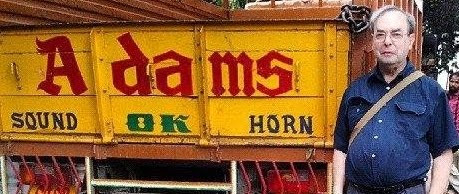First draft composed 38,000 feet above sea-level.
Many passengers travelling on flights between India and the rest of the world are vegetarian. When meals are being served on-board, mid-flight, everyone is offered a 'veg' (i.e. vegetarian) meal or a 'non-veg' meal (i.e. one containing any of: meat/fish/egg).
I have nothing personal against vegetarians or vegetables, but I do prefer a meal to include meat, fish, or egg.
Many years ago, I flew from London to Bangalore (India) via Frankfurt on Lufthansa, the German airline. We were served two main meals between Frankfurt and Bangalore. The first of these were available as veg or non-veg. I chose the latter. When the second meal was served some hours later, there was no choice - I was presented with a veg meal. It was completely vegetarian and did not look at all appetising to me. I called the stewardess, and told her that I must have some meat or fish instead of the veg meal.
She said to me in her good English with barely a hint of a German accent:
"In Germany, we believe that you should not eat meat more than once a day because it is not healthy."
I told her that my health was my business, and that I was extremely hungry and likely to become hypoglycaemic soon. She disappeared from the economy class cabin, where I was seated, for a few minutes, and then returned with a delicious selection of seafood.
"I have brought you this from Business Class," she explained.
I thanked her, but could not help wondering why it was unhealthy to eat non-veg more than once a day in Economy Class, but not in Business Class.
Usually, we fly with British Airways on their non-stop flight between London and Bangalore. We always sit in the euphemistically called "World Traveller" cabin - 'Second Class' would be the best possible description of this mode of travel. The regular food served in this cabin has always been mediocre at its best. When I complained about this to one of my patients, who works as a British Airways cabin crew member, he suggested that we should pre-book 'seafood' meals. We followed his suggestion, and noted an improvement in what we were served on-board.
More recently, maybe three years ago, I was seated next to a devout Moslem couple on a British Airways flight from Bangalore. The woman wore head-coverings and her husband was dressed in a Pathan suit. They prayed frequently and ostentatiously during the flight. When their meals were served, I noticed that they were being served with non-veg dishes that looked positively mouthwatering in comparison to our seafood meals. They were eating fragrant biryanis and bits of kebab. Watching them, I suddenly realised the solution to the meal problem on British Airways.
From that time onwards, I have always pre-booked 'Moslem meals' on Brithish Airways. We have rarely been disapointed with the quality of these meals, which we have been served more than 7 miles above sea-level. I have often wondered what the cabin crew think when having served us our Moslem meals, we then accompany it with a gin and tonic or a Bloody Mary.










